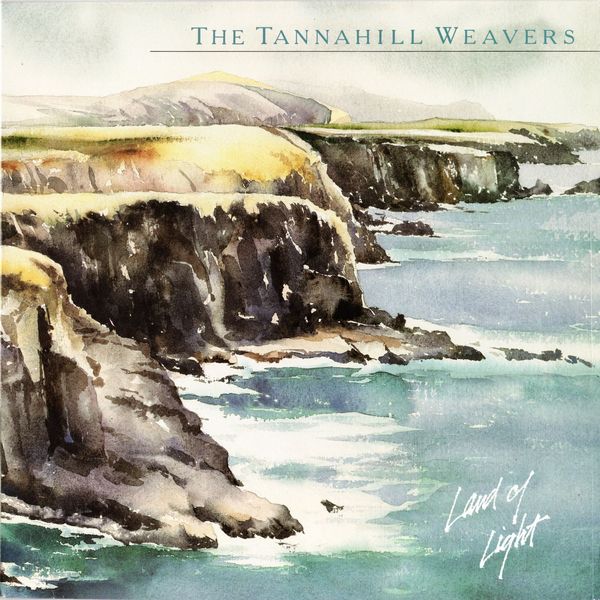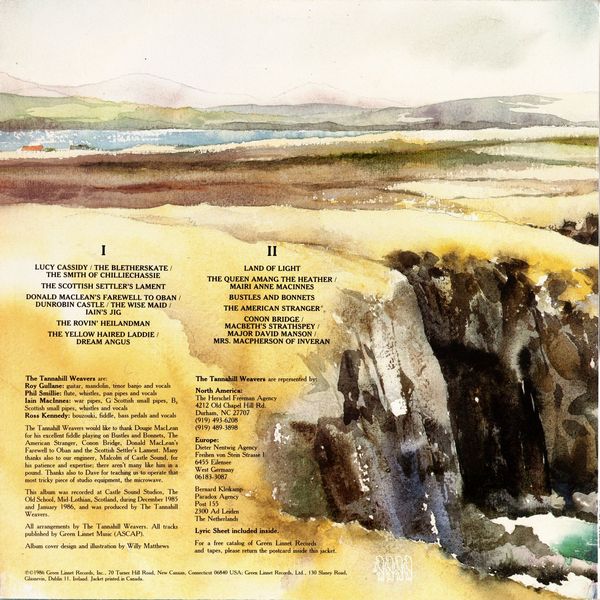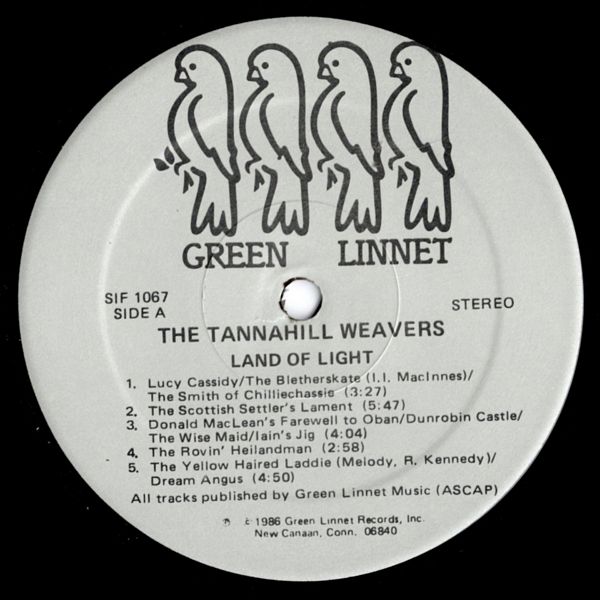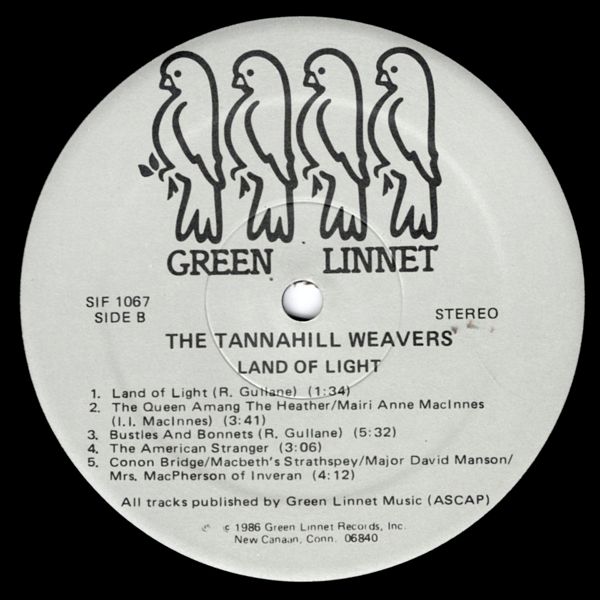

 |



|
Sleeve Notes
The Tannahill Weavers would like to thank Dougie MacLean for his excellent fiddle playing on Bustles and Bonnets, The American Stranger, Conon Bridge, Donald MacLean's Farewell to Oban and the Scottish Settler's Lament. Many thanks also to our engineer, Malcolm of Castle Sound, for his patience and expertise; there aren't many like him in a pound. Thanks also to Dave for teaching us to operate that most tricky piece of studio equipment, the microwave.
Lucy Cassidy, The Bletherskate & The Smith Of Chilliechassie — Hornpipes are very much in vogue with pipers at the moment and Lucy Cassidy is a fine modern example. Lucy was a famous lady in her own way. For 20 years she was married to a man with a severe drinking problem; he only had one mouth. One day, after all those years, he discovered the family nest egg in a bottom drawer: 500 pounds and three golf balls. "Oh, what a wonderful person you are, Lucy, scrimping and scraping away all these years to make our old age a little bit easier. But, tell me, where did you get the golf balls?" "Well," said Lucy, "you know there were nights when I wanted a bit of fun, too. But night after night, home you'd come drunk and uncatchable. Night after night, you would stand at the door of our boudoir with spinning eyes and say, "The next time that bed comes 'round, I'm getting on." Night after night, you would ask me for black coffee and I'd refuse. I didn't want a wide awake drunk on my hands. On some of these nights, I would creep next door to Harry the golfer for some love and affection. Every time I did he would give me a golf ball to remember it by. I'd bring them home and put them in the bottom drawer … then I sold them twelve for a pound." The Bletherskate is yet another of Iain's many compositions. A rough translation of the title would be: one with a tendency to be ever so slightly loquacious. Iain wrote this as a tribute to Rab The Ranter, a piper of some prowess, whose association with Maggie Lauder has been immortalized in piping lore: The Smith of Chilliechassie is a pipe reel of some antiquity which appears in a number of different forms. Like many tunes, it first appeared with only two parts (not unlike a baby's bottom) which have been added to over the years, possibly to make it a greater test of dexterity on the competition platform. The variations are, however, quite imaginative.
The Scottish Settler'S Lament — If you travel as much as we do, you will easily relate to this song's sentiments. The lyrics were written by Alexander Glendinning to the tune of William Marshall's Miss Admiral Gordon's Strathspey. In using that particular melody, he is in very fine company indeed, as "Rabbie" himself used it for his O' A' The Airts The Wind Can Blaw. Warning: if you become homesick easily, listen to this with a friend.
Donald Maclean's Farewell To Oban, Dunrobin Castle, The Wise Maid & Iain's Jig — Donald MacLean's Farewell to Oban is said to have been written by Archie MacNeill to commemorate the precipitate departure of his friend Donald from the Oban Games. It is commonly believed that his exit was caused by a dispute over the placings in a piping competition. This is, in fact, untrue. Donald MacLean was a very small man who would compete regularly in the sport of greyhound racing … as a jockey. It was over a dispute concerning the placings in his particular race that year that he left the games. Dunrobin Castle was the seat of the Duke of Sutherland, a man who did for populating the north of Scotland at least as much as mixamatosis did for the rabbit. The tune comes from a pipe collection of music from the northeast of Scotland, William Gunn's Caledonian Repository published in 1867. The Wise Maid is a pipe adaptation of a fiddle tune to be found amongst the volumes of Kerr's Merry Melodies, possibly written in honor of the woman who managed to wangle a job as a snow plow driver in Trinidad. Not only that, but she managed to fiddle some overtime as well. The jig was collected by our own Iain, who added the variations.
The Rovin' Heilandman — A transportation ballad from the northeast of Scotland, an area discovered by Queen Victoria in the 19th century and the oil men in the 20th. The penalties for poaching, or feeding your family from the land, depending on which side of the fence you sat, were severe. In this case our hero is forced to leave his wife and four children: Adolph, Rudolph, Getoph, and Stayoph, and make the long journey south to Australia. This song reminds the writer of a true story which occurred during a walk along the banks of the River Esk near Edinburgh. I was walking along with my father watching an old man fishing from the river side when up stepped the Lord of the Manor. "Ho!" said he to the old man, "You can't fish here, that's my water." "Well, you'd better watch out," says the old one, "you're letting it all run away."
The Yellow Haired Laddie & Dream Angus — A song from Ross to finish the side. A classic, almost fairy tale lyric wherein the fine young clan chief is slain in battle. Dream Angus is the Scottish "sandman" who comes 'round at night to help the children off to sleep. Unlike other countries' sandmen, Angus brings with him a bottle of whiskey. If the child is not fast asleep by the time the whiskey is finished, he wallops them over the head with the empty bottle.
Land Of Light — When you wake up to a beautiful dawn in the middle of wild, breathtaking scenery in a troubled land; when you have met and enjoyed the people, their open heartedness, friendship and humor; when you realize how much there is to share, you can't help but wish that we humans would put the same effort into living together as we do into knocking lumps out of each other.
The Queen Amang The Heather & Mairi Anne MacInnes — A romantic little ditty this, concerning an extremely swift courtship. As with most songs of this genre, everyone lives happily ever after. There is a seventh verse to this song which is sometimes sung. It wraps the song up nicely:
We baith sat doon upon the plain,
We baith sat doon and spoke thegether.
And we left the yowes tae roam their lane.
'Till I loo'd my queen amang the heather.
The fine tune heard at the end of this song is one which our piper, Iain, composed for his mother.
Bustles and Bonnets — This song is, quite simply, a potted history tracing the demise of that most majestic of creatures, the whale. It is a horrible indictment of man's "carry on regardless" attitude that there are so many endangered species in the world today. A few years ago we performed at a save the whale rally in London's Trafalgar Square. Amongst the audience were persons unknown who inflated a life size rubber whale while we played. It was subsequently used to block the world-famous Tower Bridge. This song is for these people who did that and so much more in an effort to draw our attention to what is going on around us. The song is so entitled because bustles and bonnets were constructed from whale bone. For this and other fairly useless items whales were killed in the hundreds. Perfume is also mentioned in the song; this is because part of a whale's brain secretes a musk which was used in the manufacture of scent. Bustles, incidentally were that part of a dress which stuck out at the back, giving the impression of something large beneath. Just goes to show you how fashion changes. Nowadays, at the slightest hint of something large beneath, people start jogging like mad.
The American Stranger — All the songs of immigration that we had previously heard had been written by those people who had settled in America. Here is one that was written by someone who wen the other way, west to east. This version, curiously enough, was collected in the heart of Burns' country, one of the epicentres of Scottish song and verse. Although the song was written by someone with obvious American connections, it is now firmly embedded in the Scottish tradition. From a historian's point of view it is very interesting in that it is one of only two recorded instances of a settler of Scottish extraction making the return trip. The other was a young lady who was so determined to return to the land of her forefathers that she walked from Chicago to the East Coast. On arrival in New York, however, she discovered herself to be penniless. Such was her courage that, rather than give up, she decided to offer her favors in exchange for a share of some sailor's berth across the Atlantic. As you can now doubt imagine, the offer was one that no sailor worth his salt (no pun intended) could refuse. Unfortunately, after three days at sea, she was discovered by the captain of the vessel who informed her that she was, in fact, aboard the Staten Island Ferry.
Conon Bridge, Macbeth's Strathspey, Major David Manson & Mrs. MacPherson Of Inveran — Two tunes here from the pen of the legendary G. S. MacLennan, probably the finest composer of pipe music this century. His most classic piece, The Little Cascade, is one which is played by thousands of instrumentalists throughout the world. You will search in vain for Shakespearean allusions in Macbeth's Strathspey, a tune probably associated with John Macbeth, a native of Sutherland, who gained a certain notoriety as piper to the Highland Society of London in the mid 19th century. Although our information on the composer of this tune is somewhat scant, we believe it to have been written by one Angus "Marinade" MacTavish; so called because he was in the habit of leaving his wife overnight.